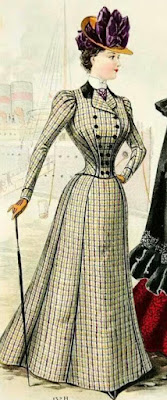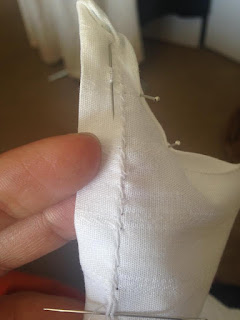Revolutionary War Weekend Report
Sunday, I participated in my 3rd Revolutionary War Weekend at Historic London Town and Gardens in Edgewater, Maryland.
Each year that I have attended RWW, I always find myself pleased with how the historic site just comes alive with both reenactors and visitors, as we recreate the events of LT receiving word of the United State's independence in July of 1776; this is mainly because of the museum's improvements to expand this particular program. They think up new ways to best engage the visitors by demonstrating public life in the small town and the effects that the war had on individuals that lived and worked there.
So, with that said, here's my question of the day: How did the American Revolution affect small towns? How did it affect merchants, sailors, slaves, families and local government? What about religion?
While the reenactment itself was loosely 3rd person, we were free to do 1st person impressions as well. I reprised my role as Charlotte Carter: British Loyalist & Merchant. My story for this event was that I was traveling from Virginia with Reverend McAllister and his wife to visit London Town.
As actors and visitors participated in a reenactment of an 18th century Sunday service, I learned that religion was highly affected by the politics of war. For example, the Anglican Church adhered to the authority of the King of England (as he was the head of the church); obey the laws just as you would obey the laws of God. However, during the Revolution, that changed. According to Reverend McAllister who conducted the service, he explained that the clergy were ordered to omit any prayers for the King and to replace it with prayers for Congress and the United States. I thought this was very interesting because I always thought about "Church and State", whereas the church controlled the state, and then the separation of the Church when Congress began to take root into the country. This example, definitely showed the premise of that. To watch the reenactment, here is the link.
After services, I wandered around the site for a little bit and checked out the docks from the rear veranda. To best describe it. . . aside from how gorgeous it was outside, the cross breeze coming from the river was an absolute godsend! Exploring the grounds some more, I came across plenty of demonstrations: sewing, military drills, rope making, cooking, etc.
 |
| This is where the trade ships and the LT ferry would come in and dock |
Around noon the tavern came alive not just with food and games, but with the Pennsylvania regiment passionately reading the Declaration of Independence (with an assortment of firewood and tankards for some reason). After declaring independence, the floor was open to debate- but this time everyone was included. Visitors reflected on how the inflictions and injustices brought on by the Crown affected the colonists and brought up some pretty good points.
Remember the question I asked in the beginning? Well, as it goes, Sailors were kidnapped by hired out gangs and placed on ships and forced to work for the British, these were called impressment gangs or "press gangs". This of course would affect their families as the wives of sailors would actually fight back violently with everything they could get their hands on in order to recover their husbands.
As the debate went on, we discussed how the revolution affected local government. Because each colony now had a representative in Congress, the local Governors of each colony were also involved, as were the Mayors who governed small towns. Where did their loyalties lie, and how would they take on these new responsibilities of governing what was the colony-now turned state? Now that they were no longer to answer to the King and his mandates, but how would they be able to successfully work along side with Congress? (keep in mind, the branches of Government had not yet been established in 1776-so there were no checks and balances; some Governor's were still loyal to the Crown and could get into serious trouble if caught). Can you imagine the anxieties the Governor's must have felt? For example take Lord Dunmore. He was the Governor of Virginia (whom I love to talk about because of Dunmore's Proclamation) and a British Loyalist. With civil and military unrest brewing in the state of Virginia during the peak of the war, plus breaking the treaty and betraying the Shawnee tribe (which was a terrible move on his end), he and his family quickly packed up and fled Williamsburg in the middle of the night. Dunmore and his family moved to England and he later became Governor of the West Indies. The people of Virginia labeled him as a traitor and a coward.
 |
| He had a LOT of fire wood and tankards handy...still not sure why |
As the debate continued, we were then split into several small groups where we could talk with visitors and other reenactors on a more concentrated level (which I really liked). It was more private and not staged. Visitors could ask questions and brainstorm without feeling singled out among their peers.
When it was time for me to give my opinion on what the Declaration of Independence meant for me and my family in the 18th century, I pointed out the problems that women faced. Women's political opinions were not openly recognized during that time. Plus to further my point, African Americans were not legally considered US citizens until 1867, during the time of Reconstruction. So as I am both black and a woman, anything politically involved (like voting) would not apply to me, but would apply to my husband, who is white. In fact, our marital status would be recognized as a "common law marriage" because marriages between two races was illegal in Maryland and in other states. *
Finally, there was talk about how difficult trade would be for merchants because of embargoes and other disruptions. As there were many local merchants who did business in London Town, there was also those who worked on a larger scale (such as trading companies) and were heavily ripped apart due to politics. According to the history of London Town, the town later fell like Rome because of a feud between local merchants who sided with the British and sided with the Patriots. It had gotten so bad that they had packed up their shops and moved elsewhere, leaving the town destitute. Only the Brown House, which was the tavern and ferry for the town, but as Annapolis began to grow in numbers and became more profitable, everyone else moved there instead. The Brown House was then converted into an Alms House for the poor and ill and was used until I believe the late 1970's. All of this because the merchants moved away from the area due to political reasons.
 |
| Recruitment sign being placed in the Tavern |
So! There you have it! The American Revolution in Historic London Town in 1776. Looking back on Sunday's event, I would definitely say that it was a success and I can't wait to see what we do to expand on it next year.
*My husband and I have started doing some research on marriage laws in Maryland not only because we are a interracial couple and want to know more about its history and how the law affected interracial marriages dating from the 17th-20th centuries, but to also incorporate that knowledge into our impressions...how did the miscegenation laws affect biracial couples? Also, when we have children one day and they have questions, we'll know how to best answer them with historical facts as well as to tie in a life lesson about how love wins (and the Lovings's case). But I'll talk more about that much later on. I've been thinking of doing a mini write up.





.jpg)


Comments
Post a Comment